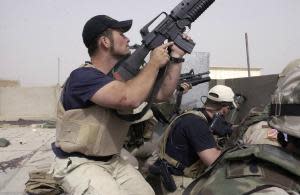 The Upshot
The UpshotProsecutions of Blackwater military contractors going awry

This week, the Justice Department announced that despite a lengthy investigation, it was dropping its case against Andrew Moonen, a Blackwater armorer who was accused of killing an Iraqi guard in 2006. The news was just the latest example of how the government's efforts to prosecute employees of the controversial security contractor (which is now known as Xe Services) are falling apart, reports the New York Times.
The key hurdle in the Moonen case appears to have been the fact that in the aftermath of the shooting, Moonen was interviewed not by the FBI but by a State Department unit that supervised Blackwater security guards in Iraq. According to Moonen's lawyer, he was told in the interview that he'd be fired if he didn't give a statement, but that he couldn't be prosecuted for anything he said. In the statement, Moonen admitted to shooting the guard but said he did so in self-defense.
The Moonen case isn't unique. The State Department is said to have given similar immunity to five Blackwater guards charged in the 2007 shooting deaths of 17 Iraqi civilians in Baghdad's Nisour Square. Partly as a result, those charges were dismissed late last year, though the government is appealing.
"Once you immunize statements, it is really hard to prosecute," one law professor told the Times. "In the field, the people providing the immunity may value finding out what happened more than they do any possibility of prosecution. But that just makes any future prosecution really very hard."
Other Blackwater prosecutions have come undone too. In September, a mistrial was declared after a jury in Virginia failed to reach a verdict in the case of two former Blackwater guards accused of murdering two Afghan civilians. A new trial is scheduled for March.
An anonymous Justice Department official admitted to the Times that prosecuting incidents that happened in war zones pose "substantial difficulties."
"There's problems with the availability of witnesses, availability of evidence, and the quality of the evidence. You also have claims of self-defense, which are generally difficult, although not insurmountable."
There are also jurisdictional issues. Contractors for the Defense Department can be prosecuted under the Military Extraterritorial Jurisdiction Act, but it hasn't been established that State Department contractors also fall under the law. "You may not even have a law that supports the prosecution of a Department of State contractor," one expert tells the Times.
Because of the Nisour Square shootings and other violence involving Blackwater guards, the firm was barred from operating in Iraq in 2009. And as a presidential candidate, Hillary Clinton pledged to ban the company from federal contracts. But through a partnership, it recently won a piece of a major State Department contract to provide security to U.S. embassies around the world.
(2004 photo of plainclothes contractors for Blackwater engaged in an Iraq firefight: AP/Gervasio Sanchez)

